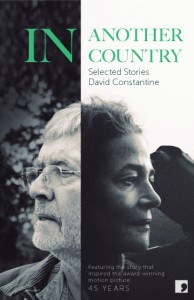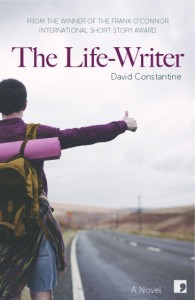and In Another Country: Selected Stories
Published by Comma Press, 24 and17 September 2015
Reviewed by Alison Burns
Poet and translator David Constantine was awarded the Frank O’Connor International Short Story Prize 2013 for his collection, Tea at the Midland, the title story of which won the BBC Short Story Prize in 2010. This year, his story ‘In Another Country’ appeared in a new incarnation (adapted/extended by director Andrew Haigh) as the acclaimed film 45 Years, starring Charlotte Rampling and Tom Courtenay. The Life-Writer is his long-awaited second novel. In Another Country is a specially selected collection of the best of Constantine’s stories from the last two decades, published to celebrate the launch of the film. Read together, they show a passionate and sensitive writer’s mind dealing with the great questions of life.
In The Life-Writer, biographer Katrin’s dying husband, Eric, becomes remote. Only on his deathbed does he start to tell her about a journey he made to France in his youth, which she senses is of great importance to him. After his death, Katrin opens a trunk in their attic belonging to ‘another country’, i.e. the past. She discovers that she wants to know this man’s life before she met him – all 45 years of it. She takes leave of absence from her university department, stalls her publishers and begins sorting Eric’s memorabilia into files for each year. She translates many letters from a woman called Monique (who had turned up at the funeral), and seeks the help of Eric’s lifelong friend Daniel to unravel their meaning. She is lonely and sad; Daniel is lonely too, and longing to recount those old adventures. Katrin goes ever deeper into the land of sexual jealousy, as she pieces together Eric’s relationship with Monique. Above all, she is almost literally dying of sorrow: ‘Katrin is in a place of her own making, intensely solitary, craving the ghost of the man she married, in a youthful appearance, as she never saw him, except as an image that floated into fixity, black and white, on the waters of a dark-room half a century ago.’ In Constantine’s astute description of grief, all else loses its value against what is lost. He also offers, through his characters, some arresting observations, as when Katrin rejoices in the thought of young Eric ‘obeying life’s chief command: become the one you are!’
‘In Another Country’, the first story in the eponymous collection, shows a wife reacting in a very different way. Mrs Mercer is appalled to hear that her husband had a previous  life. The story is based on the shocking idea that someone from the past can be preserved in ice as he or she was then. Mr Mercer lost a girlfriend down a crevasse in Switzerland and, in his 80s, has just been told of the discovery of her body. ‘He fell back down the decades’, and elsewhere ‘stared at his face [in a photograph], trying to fetch out the twenty-year-old’. Whereas in the film it is her sorrow and anger that come across most strongly, here, in the story, it is his grief: he feels and feels and remembers and is pulled back and needs help to understand and bear it: ‘Though he was the one with the information his face seemed to be asking her for help with it.’ Significantly, in both the story and the novel, the wives are childless and the earlier girlfriends pregnant.
life. The story is based on the shocking idea that someone from the past can be preserved in ice as he or she was then. Mr Mercer lost a girlfriend down a crevasse in Switzerland and, in his 80s, has just been told of the discovery of her body. ‘He fell back down the decades’, and elsewhere ‘stared at his face [in a photograph], trying to fetch out the twenty-year-old’. Whereas in the film it is her sorrow and anger that come across most strongly, here, in the story, it is his grief: he feels and feels and remembers and is pulled back and needs help to understand and bear it: ‘Though he was the one with the information his face seemed to be asking her for help with it.’ Significantly, in both the story and the novel, the wives are childless and the earlier girlfriends pregnant.
The remaining sixteen stories in the collection are so rich and thought-provoking, so deserving of slow and careful reading, that I found myself able to imbibe only one or two at a time. Constantine’s imaginative empathy seems inexhaustible, his questions (embodied in his characters) of the first importance. Here are old men with sexual fantasies, lovers with dreadful anxieties, loners or eccentrics of all kinds with access to epiphany. There are stop-in-your-tracks descriptions of the natural world, such as one in an apple-orchard: ‘Quietly they moved through the apple light plucking fruit that was shining pearl and shades of red and gold and underwater green.’ Water appears everywhere, its lineaments and movement charted with real love. Just one of many stand-out stories is ‘Under the Dam’ – the Lawrentian history of a love triangle.
This sentence, from the story ‘An Island’, gives a flavour of the whole: ‘And so we left, barefoot, the light of outdoors, brilliant, chased with breeze, leapt at everything, jaunty and careless, and all the phenomena were flung into keen appearance and the light that did it to them shouted triumphantly.’

